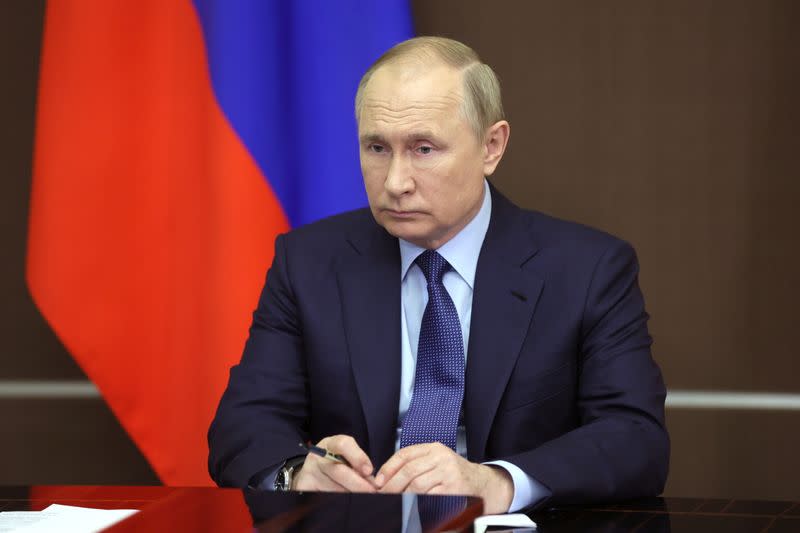Analysis-Putin's Ukraine gambit seen as part of play for new Biden summit
- Oops!Something went wrong.Please try again later.
- Oops!Something went wrong.Please try again later.
By Tom Balmforth and Andrew Osborn
MOSCOW (Reuters) -President Vladimir Putin's re-positioning of troops closer to Ukraine is part of a Russian push to secure and frame the terms of another summit with U.S. President Joe Biden, say two people close to official Russian foreign policy circles.
The other big aim is to signal to the West that it should stop helping Ukraine upgrade its military and that Kyiv should avoid escalating a grinding conflict with Russian-backed separatists in eastern Ukraine, the two people said.
U.S., NATO and Ukrainian officials have raised the alarm in recent weeks over what they say are unusual Russian troop movements closer to Ukraine, suggesting that Moscow may be poised to launch a new attack on its neighbour, accusations Russia has rejected as fear-mongering.
Russia's intentions remain unclear, and East-West tensions are running high with Ukraine, Russia and NATO all conducting military drills and Moscow accusing Washington of rehearsing a nuclear attack on Russia earlier this month.
While Putin's Ukraine gambit has multiple goals and an attack on Ukraine cannot be ruled out, one of Moscow's priorities is to get Biden's attention so that he will agree to another summit at which he and Putin can address Russian concerns over Ukraine, said the two people.
"Putin needs another summit meeting with Biden," said Andrey Kortunov, head of RIAC, a foreign policy think-tank in Moscow close to the Foreign Ministry.
"Apparently he now believes that the Europeans cannot really do much without the Americans and that the U.S. President has the final decision on European security measures on behalf of the Western alliance."
Putin has said he is worried about U.S. and NATO military aid to Ukraine and is fed up with what he says is the Western military alliance's expansion eastwards.
He has also made clear he wants the West to ensure that Kyiv does not escalate the conflict in Donbass, eastern Ukraine, where Russian-backed separatists have fought Ukrainian government forces since 2014. Major fighting there ended with a ceasefire in 2015, freezing in place a front where deadly clashes persist.
Kyiv wants the territory back, but says it is focused on its own defence and is not planning to launch an offensive. It accuses Moscow of plotting new aggression.
The Kremlin has said behind-the-scenes talks are under way with the White House over a possible Putin-Biden meeting, and Russia's Kommersant newspaper reported this month that such a meeting could take place in early 2022.
"There is an understanding that a meeting is needed, that communication between the two presidents should be continued," Kremlin spokesman Dmitry Peskov has said.
'NEW CUBAN MISSILE CRISIS'
White House spokesperson Jen Psaki said this week she had no information on any plans for such a summit, but that Washington has been discussing Ukraine with Russian officials.
The State Department on Wednesday declined to comment on the idea that Putin was trying to secure a summit by building up troops near Ukraine, but referred Reuters to a briefing it gave a day earlier during which spokesperson Ned Price said the U.S. did not know Putin's intentions but was preparing for different contingencies.
A senior U.S. administration official told Reuters there was nothing to say for now about future talks between Putin and Biden.
"Diplomacy...is the only way to move forward on resolving the conflict in the Donbass. A crucial first step is to restore the cease-fire to the low levels of violence reached in July 2020," the official said.
Putin already got the attention of Biden's White House once this year by massing troops closer to Ukraine. In April, Russia re-positioned its forces in a similar way in what it would later say was a military exercise but which at the time raised fears of a Russian attack on Ukraine. A month, later the White House announced Biden would hold a summit with Putin in Geneva.
"Obviously, since April Moscow has discovered that a new Cuban Missile Crisis over Ukraine could be very effective in getting Biden’s attention and inflaming his desire for a personal engagement with Putin," said Vladimir Frolov, a former Russian diplomat in the United States who is now a foreign policy analyst.
"Of course, Moscow uses this as political leverage over the U.S., since the last thing Biden needs at this point is another 'war in Ukraine' crisis to distract him from China."
In a speech last week, Putin said Moscow had no appetite for war, but suggested that Russia's posture in eastern Europe was paying some dividends and making its adversaries take heed.
"Our recent warnings have had a certain effect: tensions have arisen there anyway," Putin said. "It is important for them to remain in this state for as long as possible, so it does not occur to them to stage some kind of conflict on our western borders... we do not need a new conflict."
The Kremlin leader then ordered Foreign Minister Sergei Lavrov to push for serious long-term guarantees from the West that he said could ensure Russia's security.
For years, Moscow's red line was preventing Ukraine from achieving its ambition to join the NATO alliance, still widely seen as a long way off. But Frolov said other forms of Western support for Kyiv meant Moscow now has new concerns.
U.S. supplies of anti-tank missiles and ammunition, British help for Ukraine's Navy, and Turkish sales of strike drones to Ukraine have all irked the Kremlin.
"Russia's red lines have shifted: it is no longer Ukraine in NATO that is a red line, but NATO in Ukraine that is a new red line," Frolov said.
Kortunov said Russia wanted a new European security architecture where no decisions that might affect Russia's security would be taken without it.
(Additional reporting by Steve Holland and Simon Lewis in WashingtonEditing by Peter Graff)


